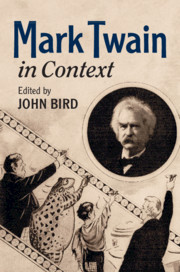Book contents
- Mark Twain in Context
- Mark Twain in Context
- Copyright page
- Contents
- Figures
- Contributors
- Preface
- Acknowledgments
- Chronology
- Abbreviations
- Part I Life
- Part II Literary Contexts
- Chapter 5 Southwestern Humor
- Chapter 6 Literary Comedians
- Chapter 7 Local Color and Regionalism
- Chapter 8 Early Periodical Writing
- Chapter 9 Travel Writing
- Chapter 10 Short Fiction
- Chapter 11 Publishing
- Chapter 12 Lectures and Speeches
- Chapter 13 Contemporary Writers
- Chapter 14 Realism and Naturalism
- Part III Historical and Cultural Contexts
- Part IV Reception and Criticism
- Part V Historical, Creative, and Cultural Legacies
- Further Reading
- Index
- References
Chapter 14 - Realism and Naturalism
from Part II - Literary Contexts
Published online by Cambridge University Press: 12 December 2019
- Mark Twain in Context
- Mark Twain in Context
- Copyright page
- Contents
- Figures
- Contributors
- Preface
- Acknowledgments
- Chronology
- Abbreviations
- Part I Life
- Part II Literary Contexts
- Chapter 5 Southwestern Humor
- Chapter 6 Literary Comedians
- Chapter 7 Local Color and Regionalism
- Chapter 8 Early Periodical Writing
- Chapter 9 Travel Writing
- Chapter 10 Short Fiction
- Chapter 11 Publishing
- Chapter 12 Lectures and Speeches
- Chapter 13 Contemporary Writers
- Chapter 14 Realism and Naturalism
- Part III Historical and Cultural Contexts
- Part IV Reception and Criticism
- Part V Historical, Creative, and Cultural Legacies
- Further Reading
- Index
- References
Summary
Mark Twain was a central figure in the prevailing literary movements of the second half of the nineteenth century: realism and naturalism. His friend William Dean Howells was the leading proponent of realism in American literature, and in Mark Twain he early saw a writer who would join him in his efforts to move literature beyond romanticism. Howells, Twain, and Henry James were the three most prominent figures, but other writers were also important. Although Twain did not write literary criticism that outlined his philosophy of realism, his practice was important in establishing realism as the prevailing literary movement of the time.
- Type
- Chapter
- Information
- Mark Twain in Context , pp. 139 - 148Publisher: Cambridge University PressPrint publication year: 2020



